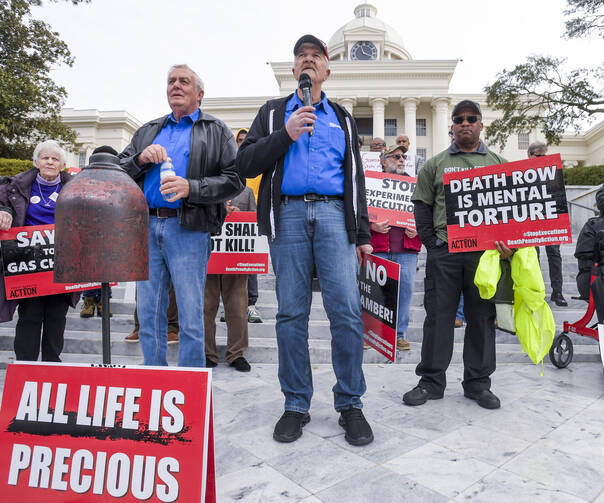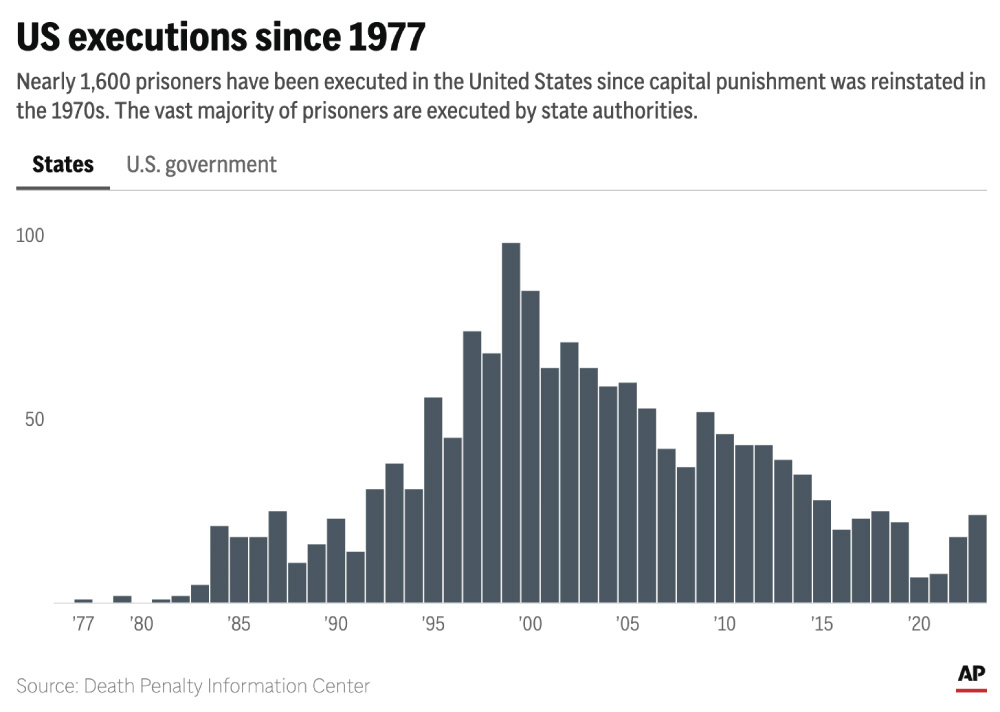Alabama death row inmate Kenneth Smith may already be dead by the time you read this.
 Former
death row inmates who were exonerated, from left, Randall Padgent, Gary
Drinkard and Ron Wright, were among the nearly 100 protestors gathered
at the state capitol building in Montgomery, Ala., on Jan. 23, 2024, to
ask Governor Kay Ivey to stop the planned execution of Kenneth Eugene
Smith. (Mickey Welsh/The Montgomery Advertiser via AP)
Former
death row inmates who were exonerated, from left, Randall Padgent, Gary
Drinkard and Ron Wright, were among the nearly 100 protestors gathered
at the state capitol building in Montgomery, Ala., on Jan. 23, 2024, to
ask Governor Kay Ivey to stop the planned execution of Kenneth Eugene
Smith. (Mickey Welsh/The Montgomery Advertiser via AP)The Weekly Dispatch takes a deep dive into breaking events and issues of significance around our world and our nation today, providing the background readers need to make better sense of the headlines speeding past us each week. For more news and analysis from around the world, visit Dispatches.
Depending on the time you happen to open your e-newsletter or otherwise click on the link that takes you to this article, Kenneth Eugene Smith may already be dead. Mr. Smith is scheduled to be executed by the state of Alabama this evening, Jan. 25, at 6 p.m.
His execution is to be administered in a wholly novel manner—nitrogen hypoxia, one apparently untried anywhere in the world in the few remaining nations where executions are still permissible. If Mr. Smith’s execution is successfully concluded, it would represent the first new method of capital punishment employed in the United States since lethal injection was introduced in 1982. States like Alabama where executions are still consistently conducted have been exploring alternative methods for ending the lives of people convicted in capital cases as drug manufacturers grow increasingly reluctant to allow their products to be used in lethal injections.
Alabama plans to put an industrial-grade respirator mask over Mr. Smith’s face and replace his breathing air with pure nitrogen gas, causing him to die from lack of oxygen. He will not be rendered unconscious before the procedure begins.
Alabama plans to put an industrial-grade respirator mask over Mr. Smith’s face and replace his breathing air with pure nitrogen gas, causing him to die from lack of oxygen.
The state believes that the nitrogen will cause unconsciousness and death quickly, but critics have likened the never-used method to human experimentation. The use of nitrogen to euthanize animals has generally been considered unacceptable by veterinary scientists. Mr. Smith’s advocates say nitrogen hypoxia could result in unforeseen suffering—that he may vomit into the facemask administering the nitrogen, and instead of passing peacefully he may choke to death.
Krisanne Vaillancourt Murphy is the executive director of the Catholic Mobilizing Network, the U.S. bishops’ official campaign against the death penalty in the United States. “[Kenneth Smith] is a human being, not an experiment,” she said in a statement released on Jan. 24. “The state’s plan to kill Kenny using nitrogen hypoxia, an untested execution method, is reckless, inhumane, and a violation of his inherent human dignity,” Ms. Vaillancourt Murphy said. “It’s confounding the lengths to which Alabama is going to take his life.”
Incredibly Mr. Smith has already gone through the lengthy, unnerving process of a death by state execution. Alabama’s first attempt to put him to death by lethal injection in 2022 ended badly. After four hours while Mr. Smith was strapped to a gurney and multiple attempts were made to locate a suitable vein for a second I.V. line, his executioners abandoned the effort to end his life when it became clear that his death warrant would expire before they could administer the lethal pharmaceuticals.
The fact that he has already endured the entire process and survived was the foundation for a first appeal to the U.S. Supreme Court to stop tonight’s execution—that putting Mr. Smith through the process all over again itself represented cruel and unusual punishment. The court turned that appeal back on Wednesday, and today Mr. Smith’s attorneys have filed a final appeal, asking the court to halt the execution to review claims that the new method also violates the constitutional ban on cruel and unusual punishment.
“There is little research regarding death by nitrogen hypoxia,” Smith’s attorneys wrote. “When the State is considering using a novel form of execution that has never been attempted anywhere, the public has an interest in ensuring the State has researched the method adequately and established procedures to minimize the pain and suffering of the condemned person.”
“The state’s plan to kill Kenny using nitrogen hypoxia, an untested execution method, is reckless, inhumane, and a violation of his inherent human dignity.”
In an interview with National Public Radio, Mr. Smith had this to say about his upcoming execution: “I’m still carrying the trauma from the last time. I’m being treated for P.T.S.D. and struggle daily. Everybody is telling me that I’m going to suffer. Well, I’m absolutely terrified.”
Robin Maher, the executive director of the Death Penalty Information Center, said in the same N.P.R. report that it was “extraordinarily rare” worldwide for someone to endure two separate execution attempts.
“Kenny has been on death row for 35 years,” Ms. Vaillancourt Murphy said. “A judge overrode his jury to give him a death sentence. He survived a botched execution, suffering through hours of poking and prodding before the state was ultimately unable to set an intravenous line for his lethal injection. And now he is being made to serve as a test case for killing by nitrogen hypoxia.
“What in the world…have we lost our minds?”
International peacemakers from the Sant’Egidio Community launched an appeal to spare Mr. Smith. “In many respects, Alabama seems to have the awful ambition of setting a new, downward standard of humanity in the already questionable and barbaric world of capital executions,” Mario Marazziti, who leads Sant’Egidio’s death penalty abolition effort, said at a press conference in Rome.
The jury that convicted Mr. Smith voted 11 to one that he should be sentenced to life imprisonment, not death by execution. That decision was overruled by the trial judge.
“We are asking that this execution be stopped, because the world cannot afford to regress to the stage of killing in a more barbaric way.”

Beyond the blunt cruelty of forcing a death-row inmate to experience his own execution multiple times, there are a few other reasons to be concerned about this particular case. The jury that convicted Mr. Smith voted 11 to one that he should be sentenced to life imprisonment, not death by execution. That decision was overruled by the trial judge, a practice that was outlawed in Alabama in 2017.
And though it is surely an unpleasant argument to make, since the death penalty was reinstated in 1976 (Gregg v. Georgia), most Americans believe—erroneously, it turns out—that capital punishment has been reserved for “the worst of the worst,” that people put to death by states and, during the Trump administration, by the federal government, should be perpetrators of the most heinous crimes. Mr. Smith’s offenses in a murder-for-hire were terrible, but they do not appear to rise to the level of barbarism that the public believes warrants the state’s own use of homicide as a tool of law enforcement and the preservation of public safety.
According to the D.P.I.C., though 2022 (18 executions) and 2023 (24 executions) saw upticks in the use of capital punishment, the long term trend has been clear: The use of the death penalty has declined sharply since peaking at 98 executions in 1999.
If it can be said to follow a pattern at all, the peculiar institution of the death penalty in the United States is most notable because of its consistently arbitrary application. That capriciousness in sentencing was part of the reason the Supreme Court suspended capital punishment in 1972 (Furman v. Georgia), but despite reforms that allowed capital punishment to be reinstated in 1976, most executions continue to be concentrated in just a handful of states in America’s south.
In fact, just one southern state has been responsible for more than a third of all U.S. executions—Texas. The Lone Star state has conducted 586 of the 1,582 executions in the United States since 1976 and eight of the 24 executions last year.
Though worldwide executions rose sharply in 2022, 112 nations, representing 70 percent of the global community, have outlawed capital punishment.
The United States is among a handful of nations in the world that still administer the death penalty. Though worldwide executions rose sharply in 2022, 112 nations, representing 70 percent of the global community, have outlawed capital punishment, according to Amnesty International. Most known executions took place in China, Iran, Saudi Arabia, Egypt and the United States—in that order.
In recent years the church, which once considered capital punishment acceptable only in societies that were unable otherwise to protect the public—certainly not the case in the United States—has maintained an increasingly skeptical view of state-administered homicide. In 2018 Pope Francis declared the use of the death penalty “inadmissible.”
The church may continue to mourn the loss of the victim in Mr. Smith’s contract-slaying conviction, Elizabeth Dorlene Sennett, said Ms. Vaillancourt Murphy, “and we pray for those who continue to grieve her death. At the same time, we do not condone this execution—nor any execution—as a form of justice.”
“Returning death for death,” she said, “only perpetuates cycles of harm and violence. We as a people of faith are called to show mercy, to believe in the power of redemption, and to provide opportunities for all people to experience healing and wholeness.”
More from America:
- Archbishop Cordileone: It is past time to strike down the death penalty
- Sister Helen Prejean’s ‘happy day’ as Pope Francis revises teaching on the death penalty
- Good Friday is the perfect day to commit to ending the death penalty
- What will it take to end the death penalty? Catholic activists say a more visceral approach is needed.
- The death penalty’s 2022 lowlight: a record number of botched executions
- The death penalty promises retribution. Restorative justice offers healing.
A Deeper Dive:
- Catholic Mobilizing Network
- Death Penalty Information Center
- The death penalty in the United States
- The Church's Anti-Death Penalty Position
- Statements from the Vatican on the Death Penalty
- New revision of number 2267 of the Catechism of the Catholic Church on the death penalty
- Letter to the Bishops regarding the new revision of number 2267 of the Catechism of the Catholic Church on the death penalty
Kevin Clarke is America’s chief correspondent and the author of Oscar Romero: Love Must Win Out (Liturgical Press).





No comments:
Post a Comment